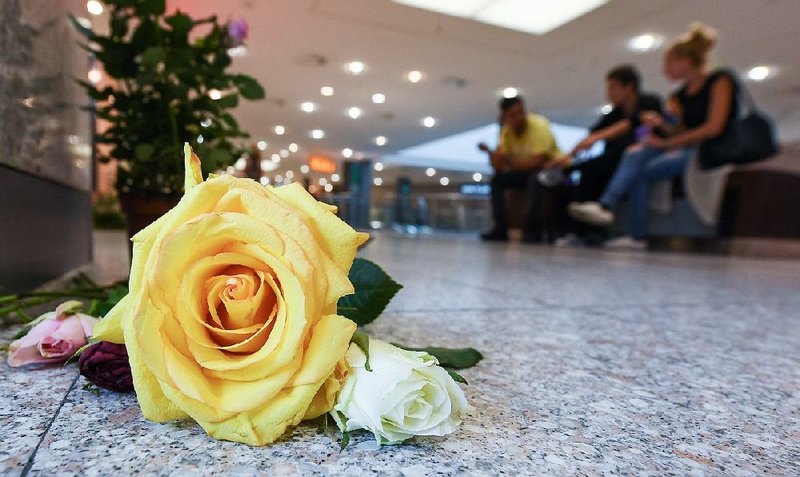BERLIN -- German officials vowed tighter security and called for tougher controls of asylum seekers Tuesday in the aftermath of four attacks in the country in the span of a week, two of which were claimed by the Islamic State extremist group.
RELATED ARTICLE
http://www.arkansas…">French priest, 85, slain in attack claimed by ISIS
The attacks left 10 dead and dozens wounded.
"The Islamic State is waging a brutal war of aggression ... against our way of life," said Joachim Herrmann, the top security official in Bavaria, where three of the attacks took place.
In the most recent attack claimed by the Islamic State, a Syrian man blew himself up Sunday outside a crowded music festival in the Bavarian city of Ansbach, injuring 15 people. The man had tried to find asylum in Germany and was awaiting deportation.
In the other attack, a 17-year-old Afghan asylum seeker wounded five people with an ax before being killed by police near the Bavarian city of Wuerzburg.
In the deadliest attack in the past week, the 18-year-old son of Iranian immigrants went on a rampage at a Munich mall, killing nine people and wounding dozens. Authorities say he was undergoing psychiatric treatment and had no known links to terrorism.
And on Sunday, hours before the Ansbach attack, a Syrian man killed a woman with a knife in the southwestern city of Reutlingen before being captured by police in an attack authorities say was not believed linked to terrorism.
Herrmann said changes need to be made to laws -- possibly at the European level -- to allow for quicker deportation of people like the Ansbach attacker, while authorities in Germany need to investigate how the man, Mohammad Daleel, was able to collect enough material to make at least two bombs in his room in an asylum seeker home.
"The people of our country cannot be expected to finance the protection of people who violate the law with their tax money," Herrmann said.
Most of the immigrants entering Germany last year were through Bavaria, and Bavarian authorities have been particularly critical of Chancellor Angela Merkel's open-door policies. Concerns had died down as the flood of newcomers has slowed dramatically, but the recent attacks have rekindled the debate over how Germany can best cope with the numbers.
Speaking alongside Herrmann at a news conference in the town of Gmund am Tegernsee before a state Cabinet meeting, Bavarian Gov. Horst Seehofer and state Justice Minister Winfried Bausback listed several proposals, including adding more police, relaxing privacy laws to make it easier for authorities to observe online data like email and WhatsApp and Skype messages, better background checks on asylum seekers, and allowing the military to be called in to help during terrorist attacks.
"We need to do whatever is necessary to protect our citizens," Seehofer said.
In Baden-Wuerttemberg, where a woman was killed by a Syrian attacker Sunday, Interior Minister Thomas Strobl also demanded a tougher stance toward asylum seekers.
"Those who abuse the right to hospitality must go back to their home countries -- make no mistake about it," Strobl told Funke media group.
On Tuesday, the Islamic State published a video of what it said was the Ansbach bomber pledging allegiance to the extremist group and vowing Germany's people "won't be able to sleep peacefully anymore." It appears to be the same as the one found by German investigators on the suicide bomber's phone and an acquaintance of the attacker verified his voice.
In the video, the man, who appears with his face covered with a black scarf, threatens to make life intolerable and that "we will blow up your homes."
On the video, the attacker said he acted in response to the extremist group's call to target countries of the U.S.-led coalition fighting it in Iraq and Syria. Germany is not involved in combat operations but has contributed reconnaissance aircraft to the effort.
He threatened that the group would carry out more violence after the bombing in Ansbach, saying "this blessed operation will be followed by others."
Frauke Kohler, a spokesman for the attorney general's office in German city of Karlsruhe, acknowledged the video circulated by the Islamic State was the same one authorities found on the bomber's mobile phone. She said authorities were investigating the extent of the bomber's communication and links to the group, as well was whether he had accomplices in Germany who aided him in building the bomb.
Investigators also need to determine how the video from the attacker got to ISIS and where he learned to build a bomb.
The bomber, who was originally from the Syrian city of Aleppo, arrived in Germany two years ago and applied for asylum in August 2014, Interior Minister Thomas de Maiziere said. It turned out that he had already registered in Bulgaria and later in Austria, so Germany rejected his request and ordered him deported to Bulgaria -- most recently on July 13.
Asylum seekers routinely are deported to the first country where they registered if they don't follow proper procedures, even if they're considered to have a legitimate asylum claim.
Information for this article was contributed by Sarah El Deeb of The Associated Press and by Anthony Faiola and Stephanie Kirchner of The Washington Post.
A Section on 07/27/2016



